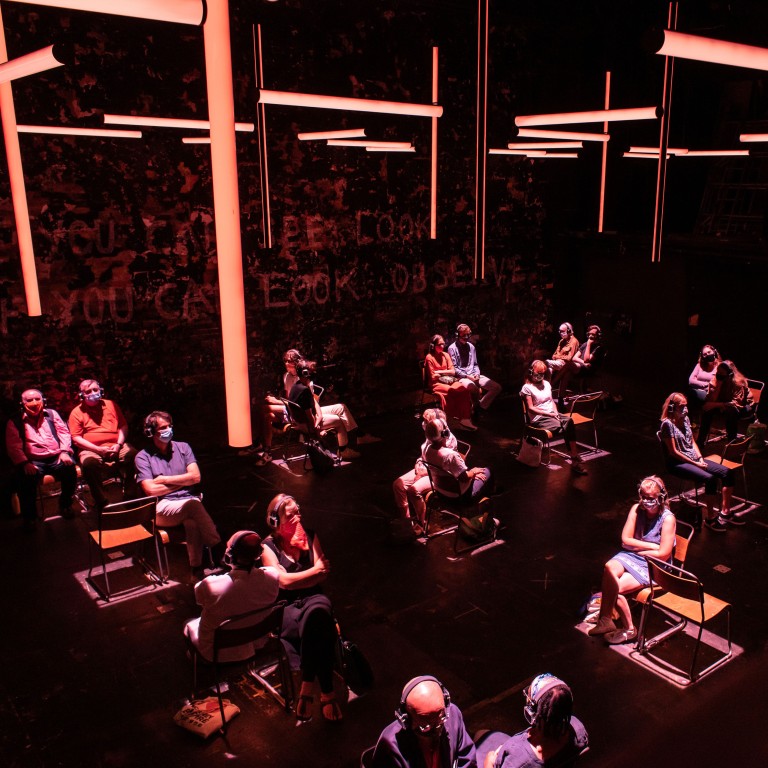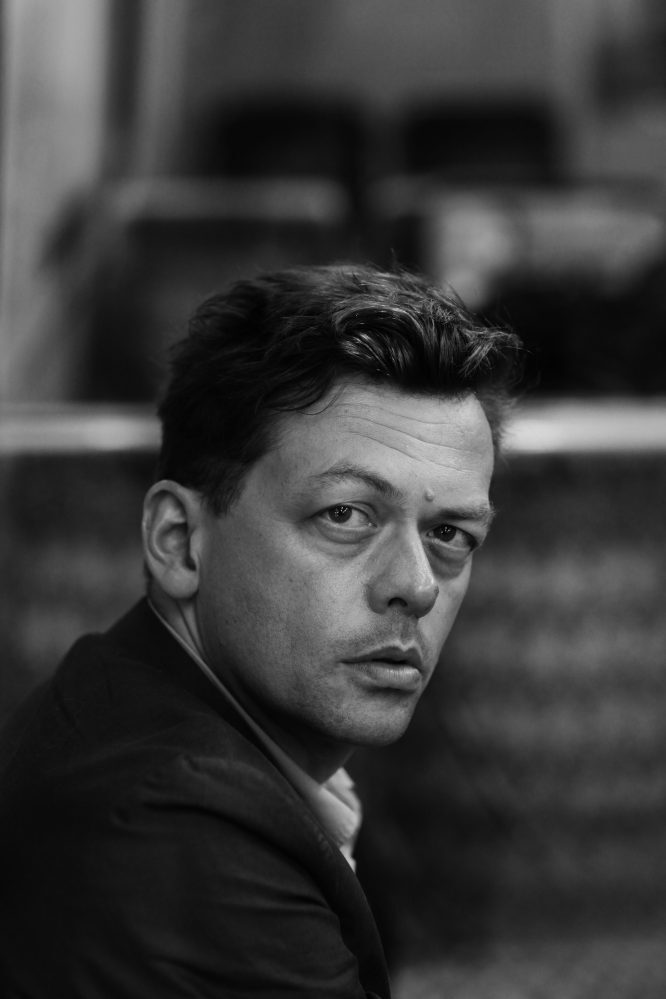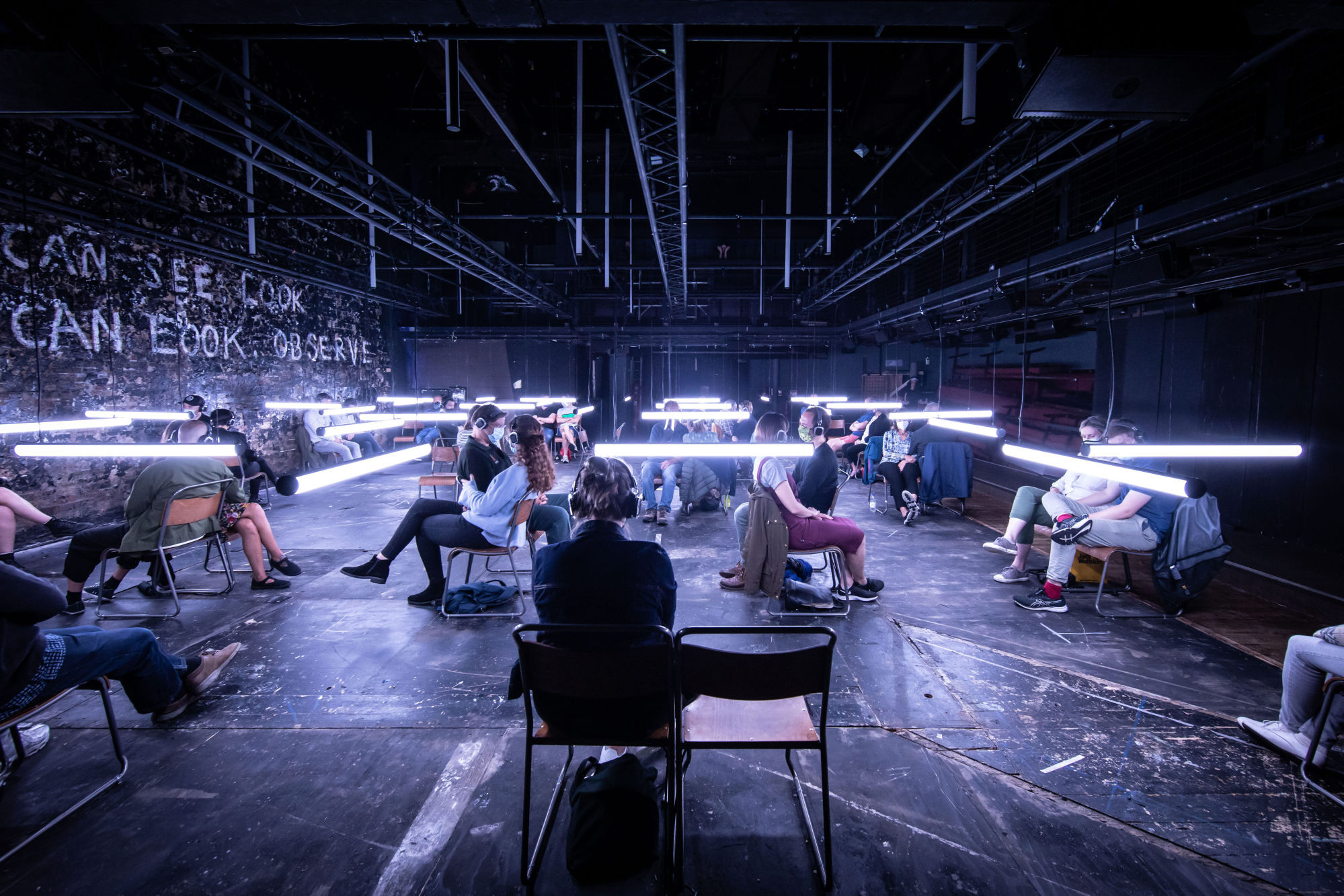
What’s it like to be blind? Terrifying one-person performance Blindness takes away audience’s sense of sight
- Showing at the Hong Kong Arts Festival, Blindness starts in light before plunging its audience into darkness, using 3D audio to unnerving effect
- It was created by Tony Award-winning playwright Simon Stephens, best known for adapting the popular novel The Curious Incident of the Dog in the Night-Time
We’ve all been kept in the dark. We’ve all been traumatised – for who knows how much longer? – by an invisible terror that has suspended everyday life and forced us to grope for answers in the void.
In 1995, Portuguese author and Nobel Laureate José Saramago published Blindness, an allegorical novel about the unravelling of society caused by a contagion: sight loss.
In the book (later filmed), an entire population is cast into darkness (or whiteness, which amounts to the same thing) and further beset by depravity. Lacking one of their senses, humans are suddenly unable to interact in their accustomed ways. Transport systems crumble, financial institutions totter and confidence in a government proven to be lying evaporates.
From rope bondage to string quartets: arts festival showcases Hong Kong talent
Describing his adaptation of Blindness as “a light and sound installation” and “a monologue with a soundscape”, Stephens explains that, far from being designed as an opportune encapsulation of an unnerving age, the work was originally envisaged as an entirely different beast.
“It wasn’t written in response to the pandemic,” Stephens, 50, says in a video call from his London home. “It’s something I’ve been working on for four or five years. The director, Walter Meierjohann, with whom I’d worked before, asked me to make another show with him and he brought me [the book] to see if I’d adapt it.
“It’s an astonishing work, of ferocity and tenderness and bleakness. Walter was really surprised when I read it and said it was uplifting – he thought either I’d read the wrong book or was deranged!”

So it’s not all gloom in the Blindness world? “Clearly, the idea of an epidemic of blindness is a nightmare,” Stephens says. “The quarantine the people go into in the old mental hospital is chilling and beyond the edges of human imagination. But they survive; and if you’re going to tell a story of recovery from the most unbearable and unthinkable atrocities, then in the very act of recovery there’s hope.”
The story of the installation’s evolution, into a production featuring a single voice, is also illuminating.
“Initially, we were going to have a big cast of dancers to make a choreographed, balletic show,” Stephens says. “Then we did a workshop at the National Theatre in London and Juliet Stevenson was part of it. She’s a performer of such brilliance, intelligence and depth, one of the most experienced actors I’ve ever worked with – stage, cinema, television, radio – and I just became fascinated by her.
“In my mind the production went from being a play with 100 people to a one-person show. So I rewrote it completely for Juliet. The idea that we landed on by the end of 2019, after a couple of years’ work, was this one-person show and we started sending it round to theatres to gauge interest.”

The Donmar Warehouse company, based in London’s Covent Garden, accepted the staging challenge. “In its early months we’d sent it to Donmar and they then became committed to the idea of doing it in the pandemic, although that raises practical issues,” Stephens says.
“The audience is seated in socially distanced pods, individually or in pairs. There are headphones on each seat, you put them on and the first third is like a conventional radio play. You’re looking around at other people and the theatre; you hear the story of the outbreak; and then there’s total blackout – you can’t see your hand in front of your face. Not a glimmer of light. Then it becomes a three-dimensional, hallucinatory experience … and you are a character in the story.”
At this juncture, the hardware that makes this unsettling auditory adventure possible deserves a mention. Stevenson’s voice was recorded via a binaural microphone, which captures and replicates how we hear sound in the real world.
“It looks remarkable – like a human head, because it is shaped to capture completely the aural resonances of the skull,” Stephens says. “If Juliet whispers, as though over your shoulder, you turn round because you think she’s there. If she rustles something you think somebody’s there making the noise.
“When she went to the show, during the part where she is heard running and pushing, she pulled her feet under her chair, scared that she was going to trip herself up – even though she knew it was her. It’s three-dimensional sound … and terrifying in the darkness.”
Too frightening for some? “Nobody has run out screaming, although a couple of people have found it too difficult to take,” Stephens says. “But the front-of-house staff are really careful and look after people. If you get too scared you can let them know and they’ll help.”
In the history of the arts, the years after catastrophes are often the most fertile – like the 1920s and 1945-55. I’m certain that’s going to happen again
When it comes to artistic achievement, Stephens is best known for adapting Mark Haddon’s perennially popular murder-mystery novel The Curious Incident of the Dog in the Night-Time, first seen, in London, in 2012. That was all part of a job that until last year regularly took Stephens around the world. It’s also a production he still finds affecting and one that informs his thoughts on where live events go from here.
“I’m still excited about going to see The Curious Incident … it still makes me happy, makes me cry and frightens me,” he says. “And there are lots of questions about what type of show will be made post-pandemic: will people want musicals, uplifting shows? Will they want to be distracted and taken out of their world?
“Theatre is extraordinary – for me it’s the best art form, [with its] visceral humanity and capacity for metaphor and storytelling. In years to come, human beings will reimagine the stories they tell themselves about who they are.
“In the history of the arts, the years after catastrophes are often the most fertile – like the 1920s and 1945-55. I’m certain that’s going to happen again.”

In the meantime, while confessing to mixed emotions about enforced isolation (“it’s been a meditative time – thinking, working, spending time with my kids”) Stephens is looking forward to revisiting previous work haunts (Tokyo, Lima, New York, Copenhagen, Barcelona) and adding new locations. But travel restrictions have caused some regrets.
“I’m heartbroken I can’t go to Hong Kong because it’s a really special place for me. I’ve had some amazing nights out in the city and it moves me that the show is going there,” he says. “I’ve visited many times; my father-in-law, Martin Heath, lived there for about 25 years. He was a passionate member of the Yacht Club and we’ve seen in the new year there, on the harbour.
“I’m really sad I won’t be able to gatecrash the club and have a drink in his honour!”
Blindness runs from April 15 to 18; HK$200 and HK$250. The Box, Freespace, West Kowloon Cultural District. Inquiries: 2824 2430

